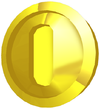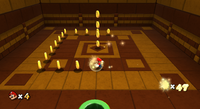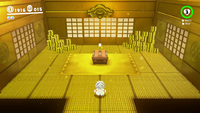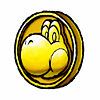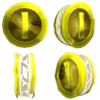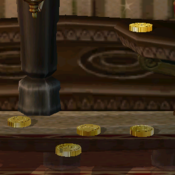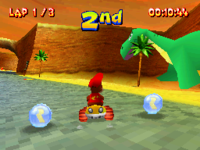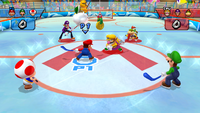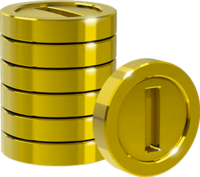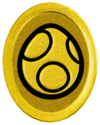History of coins
Coins have had varied roles throughout the Super Mario franchise. In the Super Mario series, particularly the sidescrolling platforming games, collecting 100 typically gives the player an extra life. In the Mario Kart series, coins appear less often and increase the racer's top speed when collected. In the Mario Party series, coins mainly appear as a currency used on the game board. Certain minigames involve the characters collecting coins, and the only way to lose in them is by not collecting any coins. Similarly to the Super Mario series, the Yoshi's Island series and Wario Land series also include coins as collectible items. In RPGs such as the Paper Mario series and Mario & Luigi series, coins are used as a form of currency to purchase items.
Mario Bros.
Coins first appear in Mario Bros. After defeating an enemy, they come out of the top pipes and slide along surfaces until they reach a bottom pipe. If obtained by either touching them or hitting them through the floor, they give Mario or Luigi 800 points. They also appear in bonus games between several phases, in which ten midair ones are littered throughout the stage and can be reached with precise jumping within a time limit. Collecting all ten results in a perfect bonus multiplier. A dollar sign ($) briefly appears whenever a coin is collected.
VS. Wrecking Crew / Wrecking Crew
In the bonus stages of the arcade game VS. Wrecking Crew, Mario must smash walls to find a hidden coin before the time runs out. In two-player mode, players compete in searching for the coin.
In Wrecking Crew, the NES version, a CPU-controlled character called Foreman Spike competes against the player during the bonus round. WarioWare Gold has a microgame based on this.
Super Mario series
Super Mario Bros. / Super Mario Bros.: The Lost Levels / Super Mario Bros. Deluxe
In Super Mario Bros., coins are the most common items found in the game. They are found in every level, spawning from blocks or floating in the air. Coins are worth 200 points when collected, and collecting 100 coins gives Mario an extra life. Coins return in Super Mario Bros.: The Lost Levels and Super Mario Bros. Deluxe, serving the same function.
Super Mario Bros. 2 / Super Mario Advance
In Super Mario Bros. 2, coins can be retrieved only by using a Magical Potion to create a door near unpicked grass. By going through this door, Mario, Luigi, Princess Toadstool, or Toad can travel to Subspace and pluck the aforementioned grass, which in Subspace hold coins, which can be used in the Bonus Chance game to win extra lives.
Super Mario Advance introduces a new type of giant red coin called an Ace Coin. Regular coins are still only found in Subspace.
Super Mario Bros. 3 / Super Mario Advance 4: Super Mario Bros. 3
Coins reappear in Super Mario Bros. 3, once again as common items to be obtained. They can once again be found in blocks and floating in the air, and they grant Mario or Luigi an extra life when 100 of them are collected. Coins can also be obtained in the flip-the-card minigames. Switch Blocks, introduced in this game, can turn Brick Blocks into coins and vice versa; some Switch Blocks also cause a new type of coin, Blue Coins, to appear. Coins are also found in the 2-Player battle mode. If a player collects five coins, they win. In the player's status panel at the bottom of the screen, a dollar sign ($) is used to represent coins. This was changed to the Super Mario Land coin sprite in the remakes.
In Super Mario Advance 4: Super Mario Bros. 3, there is an Orange Switch e-Reader card that, when activated, turns enemies into moving coins if hit by Fire Mario's fireballs, as in Super Mario World and its Game Boy Advance remake. Also, thrown objects (like shells or Ice Blocks) can pick up coins in this version, being worth double if obtained this way. Exclusive to World-e levels are Advance Coins, which work like the Dragon Coins in Super Mario World.
Super Mario Land
Coins in Super Mario Land again have the same function as they did in previous games. They are commonly found in Mystery Blocks but are also mostly found in secret stashes or bunches. In this game, coins have a different sound effect compared to the rest of the entire franchise, which is reminiscent of the Game Boy start-up jingle.
Super Mario World / Super Mario World: Super Mario Advance 2
- “YOU ARE A SUPER PLAYER!!”
- —Coins message in Funky, Super Mario World
In Super Mario World, coins act in nearly the same manner as in the previous games. In this game, however, Fire Mario and Yoshi can turn enemies into coins by defeating them with fireballs. These enemies can respawn offscreen if the coin is not collected. Jumping on a yellow Koopa Troopa will force a coin from its shell. Coins from enemies will move around. Control Coins are coins that can be manipulated into moving to certain directions. Everything that Yoshi swallows also count towards Mario's coin total.
If Mario or Luigi jumps on a Gray P Switch, some types of enemies will turn into Gray Coins. In addition to counting as regular coins, each coin collected gives multiplied points, up to 3-UP in the original game, or 5-UP in the Game Boy Advance port.
If Yoshi eats two Pink Berries in the same level, he will lay an egg which will hatch a Yoshi Cloud that throws smiley-faced Bonus Coins. Bonus Coins can fall through the floor after bouncing once, making them slightly tricky to catch. If all ten Bonus Coins are collected, the Yoshi Cloud will throw a 1-Up Mushroom before flying away.
In most levels, Dragon Coins appear. Dragon Coins are large coins with an oval shape and a profile of Yoshi on them. If Mario collects five of them in a level (usually the maximum number found in a level, but sometimes not), he gets an extra life. Any Dragon Coin above that is also an extra life. In Super Mario World: Super Mario Advance 2, Dragon Coins appear in every level, and if Mario collects them all, the Dragon Coins are replaced by Peach Coins, which serve the same function.
Super Mario Land 2: 6 Golden Coins
Coins are collected via usual means in Super Mario Land 2: 6 Golden Coins, but they are instead used to buy extra lives and power-ups through a gambling minigame whose stats can be changed depending on how much was spent.
Super Mario 64 / Super Mario 64 DS
Coins, also named Yellow Coins,[1][2] once again commonly appear throughout Super Mario 64 and its remake, Super Mario 64 DS. Unlike in its preceding games, coins have a star-shaped symbol and can be found by defeating enemies. In this game, coins restore Mario's lost health as well as his oxygen when he swims underwater. Unlike in previous games, Mario gains an extra life for every 50 coins he collects each time he completes a level, but only up to three lives (no more than 150 coins). Collecting 100 coins in a level grants Mario a Power Star. Both versions of the game track the highest number of coins collected in a course on the score screen.
In addition to standard Yellow Coins, Red Coins and Blue Coins reappear. Red Coins are worth two regular coins when collected; there are always eight of these found in the levels in which they appear. Blue Coins are worth five regular coins when collected and are found usually by ground-pounding Blue Coin Blocks or defeating certain enemies such as Boos or Mr. I's.
In Super Mario 64 DS, instead of animated 2D sprites, coins are fully modeled in 3D and, as a result, look octagonal. Yoshi is able to stick out his tongue and swallow coins to obtain them.
Super Mario Sunshine
Coins also serve the same functions in Super Mario Sunshine, retaining their healing properties and granting Mario a life for every 50 collected. If Mario collects 100 coins in a region, a hidden Shine Sprite will be revealed to him. Blue Coins also return and are able to be traded in Delfino Plaza for Shine Sprites at 10 coins per Shine. Also, just as in Super Mario 64, top coin scores are once again tracked for each course, but with a Shine Sprite icon next to the count if Mario succeeded in reaching the 100-coin mark and collected the Shine Sprite that comes with it.
New Super Mario Bros.
In New Super Mario Bros., coins are found in many places. They can also be obtained by defeating enemies with fireballs, like in Super Mario World. Star Coins are found for the first time in this game. There are three of them in every level. They can be spent on unlocking bonus areas on the map that are blocked by Star Coin Signs and on backgrounds for the bottom screen. If the player collects all Star Coins and unlocks everything, the file receives three stars, indicating 100% completion. Red Rings are also present in this game. If the player touches the Red Ring, eight Red Coins appear. If the player collects all eight Red Coins, they receive a power-up or a 1-Up Mushroom, depending on the player's current condition. Blue Coins also return with their Super Mario Bros. 3 role.
Super Mario Galaxy
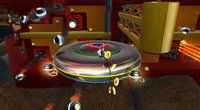
In Super Mario Galaxy, coins are much rarer in this game than in prior 3D games; newly-debuting Star Bits are much more common and also give extra lives for every 50 collected. Coins work like they do in Super Mario Sunshine, but unlike in that game, collecting 100 coins does not make a Power Star appear. Mario can now acquire coins by shooting certain yellow spots or flower buds on the ground or stomping an enemy (as star spinning makes foes drop Star Bits instead), in addition to the methods in prior games.
? Coins are also found in this game. They are bigger and cause miscellaneous effects, such as musical notes appearing to collect or producing a trail of Star Bits.
Purple Coins are also introduced in this game. In some of the missions in the game, Mario or Luigi needs to collect 100 Purple Coins in a level in order to obtain a Power Star. They are scattered all over the galaxies and sometimes have a time limit to collect them all. It is possible that Purple Coins took the role of regular coins, since 100 Purple Coins are required to gain a Power Star.
As in previous 3D Super Mario titles, the top coin scores in each course are tracked on the Score screen, but also the top coin scores for each individual Power Star are tracked on the Star select screen for each course.
New Super Mario Bros. Wii
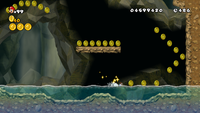
In New Super Mario Bros. Wii, coins, Red Coins, Dash Coins, Blue Coins, and Star Coins return, serving the same functions as previously. Flowers located in the background release coins when spun next to. During Kamek's boss fight, he occasionally uses his magic to turn platforms into coins.
Super Mario Galaxy 2
Coins return yet again in Super Mario Galaxy 2. They are a lot more common, and the player can usually find many of them in secret areas. They heal the player by one unit of health. Unlike in the other 3D Super Mario games, the requirement of an extra life is 100 coins as opposed to 50. This happens only when returning to Starship Mario, much like in Super Mario 64 and its remake.
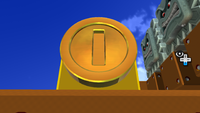
Unlike in the first Super Mario Galaxy and other 3D Super Mario games, top coin scores are no longer tracked, replaced by a counter of the fastest time to each Star. However, the coins collected in a stage are added to a pool of coins that can eventually be used to buy spins of five Chance Cubes.
They also refill Mario's air supply slightly while underwater, as well as giving Bee Mario more flight time. Hungry Lumas in several galaxies may ask for coins instead of Star Bits.
A notably large coin appears in the Supermassive Galaxy; however, it is not a collectible item. Instead, Mario must wall-jump off of it in order to reach the top of a Mega ? Block. However, it still turns like a normal coin.
Super Mario 3D Land
Coins appear again in Super Mario 3D Land. As in the 2D games, coins are only used to give Mario an extra life for every 100 collected. Coins completely replace points in this game. Enemies now give coins, rather than dropping them, when stomped, ground-pounded, tail-whipped, touched while invincible, or upon grabbing the Goal Pole, which itself gives coins depending on how high Mario lands on it (except the top, which gives an extra life). At the end of every level (except for Template:World-link 2), one coin is gained for every 10 seconds remaining on the Time Limit counter. Coin rings, yellow versions of Red Rings, also debut in this game; they give five coins when passed through.
Infinitely spawning enemies (such as those spawned from Baddie Boxes) stop giving coins after the third such enemy is defeated.
New Super Mario Bros. 2
Coins once again appear in New Super Mario Bros. 2, where they are extremely common and are the main emphasis of the game. A side-goal of the game is to collect 1,000,000 coins total, which awards the player with a gold Mario statue in the title screen; this changes to a gold Raccoon Mario statue as an award for getting 9,999,999 coins. There are new power-ups that help Mario get large numbers of coins, including Gold Flowers (which turn Brick Blocks into coins, empty item-holding blocks, and make enemies give coins), Gold Blocks (gilded Brick Blocks that give Mario coins automatically if he moves while wearing one), and Gold Rings (yellow variations of Red Rings that make enemies golden and give Mario coins for each one he defeats). Coins also have different denominations such as 10 or 100, and Roulette Coin Blocks can also give Mario a different number of coins.
New Super Mario Bros. U
Coins reappear in New Super Mario Bros. U, working as they do in the previous 2D games. Green Coins also debut in this game, working like Red Coins. In some levels, there are coins falling with parachutes, similar to some of the Red Coins from New Super Mario Bros. 2, coming in groups of one to three.
Super Mario 3D World / Super Mario 3D World + Bowser's Fury
In Super Mario 3D World and Super Mario 3D World + Bowser's Fury, coins are very common like in its predecessor and work similarly, though points are generally reinstated, as in the New Super Mario Bros. games; enemies still give or drop coins when defeated, however. In this game, there are also invisible coins, which can be revealed by passing through them, similarly to Dash Coins. The player can also use the Wii U GamePad to uncover them. Coin piles can be found in often-hidden places. An in-game stamp looks like a coin. Gold Rings also return but only give three coins. Green Coins also return, though only eight appear, and collecting them all in time reveals a Green Star.
Coins also appear in Bowser's Fury, where collecting 100 of them grants the player a random power-up instead of an extra life (since lives are not present in the campaign). These power-ups include the Super Bell, Super Mushroom, Boomerang Flower, Fire Flower, Super Leaf, and Super Star. As of version 1.1.0, collecting 100 coins in the introduction before leaving Fur Step Island only rewards a Super Mushroom.
Super Mario Maker / Super Mario Maker for Nintendo 3DS
Coins reappear in Super Mario Maker and Super Mario Maker for Nintendo 3DS as objects that can be placed into a level. As of the software update released on March 9, 2016, the player can shake it to turn it into a Pink Coin.
The American English description from the Nintendo 3DS eShop says that coins can be shot out of cannons, which is incorrect.
Super Mario Run
In Super Mario Run, coins can be used to buy items in the Shop, where they can be spent to buy decorations and other items for Kingdom Builder. They are counted, along with Toads, to determine the winner of a game of Toad Rally. There have been multiple Super Mario Run events that have multiplied the victor's coins by 1.5 at the end of the round. In Remix 10, a bubbled item will appear for every 100 coins collected (a Super Mushroom if the player is small, and a Super Star if they are Super).
Super Mario Odyssey
Coins return in Super Mario Odyssey; however, rather than giving an extra life for every 100 collected (as lives are absent), or healing Mario (as hearts fulfill this role), they are instead used as a global currency in this game and can be spent on clothing, Power Moons, and Life-Up Hearts in the Crazy Cap stores spread across the kingdoms. Also, Mario will lose 10 coins each time he dies, and they can be recollected on the same spot Mario died at (before they disappear), though they will automatically vanish if they fall into a hazardous substance (such as poison). Coin rings, coin piles, and invisible coins can also be found. This game also introduces regional coins, which are purple and can only be spent in the kingdoms in which they are found.
Super Mario Maker 2
In Super Mario Maker 2, coins and Pink Coins reappear, and 10-Coins, 30-Coins, and 50-Coins are introduced as usable course elements. Coins are also used to progress in Story Mode, as they fund the reconstruction of Peach's Castle. As of the version 2.0 update, coins can now be encased in ice, being solid blocks until they are heated with fire-based attacks or enemies.
Super Mario Bros. 35
In Super Mario Bros. 35, Coins could be collected and used for the Item Roulette.
Super Mario Bros. Wonder
In Super Mario Bros. Wonder, Coins act as they do in previous games. Their choppier spinning animation is similar to those found in older games, like Super Mario Bros. 3 and Super Mario World.[3] During a Wonder Effect, coins will dance to the music. Flower coins, as well as their 10-Coin variant, are also introduced in this game.
Yoshi
Coins appear in Yoshi, after the player clears levels 25 through 27 of the B-Type game, rewarding the player 1,200 points.
Mario Kart series
Super Mario Kart
In Super Mario Kart, coins are found on each course. Collecting them makes the Karts' top speed faster, though they reach their maximum top speed with ten. When a player jostles another driver, falls off the course, or gets hit by an item (such as a Red or Green Shell), the player loses one, two, or four coins (unless they have less than that), respectively. Jostling a driver without having any coins results in sliding. Coins also appear as items which give the player two extra coins.
Mario Kart: Super Circuit
In Mario Kart: Super Circuit, coins increase top speed and weight, this time without any cap. There is an option in this game to remove the coins, but it is only applicable to Quick Run and VS mode. There are 50 coins scattered in every track, and up to 5 coins are given to the player at the beginning of the race depending on their starting position, thus the player can have up to 55 coins in a race, since the Coin item is missing. Unlike the first game, an alarm will go off if the player has 1 or 0 coins.
Mario Kart DS
In Mario Kart DS, coins are present only in Mission Mode, where players have missions to get all the coins in a course. They are varied and they can be formed either in a pattern in a battle course or a single line in a race course. The fourth boss fight of that mode, which pits Peach against King Boo, requires her to collect 50 coins while she avoids him. Any hazards can cause the player to drop coins. In these missions, a unique music track exclusive to this mode replaces the usual music played on that course.
Mario Kart Arcade GP 2
In Mario Kart Arcade GP 2, coins can be collected in races, similarly to Super Mario Kart and later games. They make the player speed up. Coins can be gained/lost by jostling other racers.
Mario Kart Wii
Mario Kart Wii only has coins during the all new Coin Runners battle game. Players collect them by driving into them, but if they get hit by an item, the players lose coins. The team who has the most coins after the three minutes are up wins. In various coin-collection tournaments, players must collect the set amount to finish the mission.
Mario Kart 7
In Mario Kart 7, coins return during races, working in a similar way as they do in Super Mario Kart. Unlike that game, however, coins collected will respawn on the track seconds later, racers can only have up to ten coins per race, and jostling other racers doesn't affect one's coin count or cause skidding if one does not have any coins. Also, racers will always lose three coins if they are hit by items or fall off the track (excluding being hit by fireballs, which makes them drop one coin, and if they have two or less). In addition to improving a Kart's top speed, collecting a coin also causes a very small speed boost. Starting with this game, every 50 coins still collected at the end of the race will unlock kart parts for the player's vehicle. A glitch causes it to be possible for the player to end the race with more than 10 coins, as long as they don't get hit before finishing, then all coins exceeding the limit will be "destroyed". This exploit allows it to be possible to unlock a new kart part every time a player completes a cup. The Coin Runners Battle Mode also returns, but with a two-minute time limit and it can be played solo; the race courses' max coin limit also applies in this mode.
Mario Kart 8 / Mario Kart 8 Deluxe
Coins return in Mario Kart 8 and Mario Kart 8 Deluxe, serving the same purpose as in Mario Kart 7. Unlike in that game, players can once again hold more than ten coins, though only in Coin Runners in Mario Kart 8 Deluxe. Vehicle parts are unlocked by collecting coins from races, Time Trials, online races, and battles (the latter only in Mario Kart 8 Deluxe). Coins collected by additional players are counted (only in the original game). Coins will count towards the player's coin total only for completed matches — if the player collects coins then quits during a match, the coins from that race will not be added to their coin total. The Coin item from Super Mario Kart also returns, working as it did in that game. Due to an update in August 2014, it is now possible to view the exact number of coins collected through matches.
On Hyrule Circuit, coins are replaced with Rupees, on Animal Crossing, they are replaced with Bells, and on Urchin Underpass, they are replaced with Cash, the currencies of the series of origin (The Legend of Zelda, Animal Crossing, and Splatoon, respectively). On Mute City and Big Blue, coins are not present on the track, but are instead obtained either from driving over recharge strips on the track, knocking them out of rival racers, or from Item Boxes. On the Yoshi's Island course featured in the Mario Kart 8 Deluxe – Booster Course Pass, coins use their design from the Yoshi's Island games, depicting Yoshi's face on either side, and produce the same sound heard in those games when collected.
Mario Kart Tour
Coins appear in Mario Kart Tour, where they work in a similar manner to previous entries. In this game, the counter displays more than ten coins per race, like in Super Mario Kart and Mario Kart: Super Circuit, and coins from Item Boxes are automatically used. However, coins do not provide any speed advantages to the player during races. The player is given points for every coin they get in a race. Red and Blue Coins also appear in Coin Rush and various bonus challenges, and are worth two and five coins, respectively, as in Super Mario 64. Up to 300 coins can be earned from races daily, or 600 if the user is subscribed to the Gold Pass. The Coin Box item also releases many coins at once. The Coin Box+ boost also allows Red Coins to be released by the Coin Box. Coins can be used in the shop to buy drivers, karts, gliders, item tickets and point-boost tickets. Players can send Greeting Coins to their friends once every day, which gives them five coins. If a player does not collect the coins given by their friend, the coins will begin to stack.
During events, coins are usually replaced by event tokens and Team Rally tokens. Some of the coins released from the Coin Box are also turned into event tokens. The Red Coins created by Coin Box+ boost are also replaced by event tokens.[4]
The following gliders increase the chance of getting coins from Item Boxes and points from collecting one.
| Special skill | Gliders |
|---|---|
Coin Plus Increases your chances of getting a coin. Using one will get you more points. |
— |
| +2 points | |
| +3 points | |
Super Mario Bros. film
Although coins are not given an on-screen appearance in the 1993 Super Mario Bros. film, they are alluded to by an elderly woman mugging the Mario Bros., referring to them as "Koopa Coins".
Wario Land series
Wario Land: Super Mario Land 3
In Wario Land: Super Mario Land 3, Coins, also named 1 Gold Coins,[5] have a similar function as the Super Mario games. These coins can be obtained by finding them in air or in water, by destroying blocks, or by defeating enemies with a body slam. They come in two varieties, a normal coin and the 10 Gold Coin, which are worth ten coins. 10 Gold Coins can be used after getting at least ten coins and pressing ↑ +
. They can be used to activate checkpoints, defeat enemies, or open doors. They can also be found when Pouncer stomps on an enemy, when Pikkarikun zaps an enemy, when enemies are thrown at Chicken Ducks, or when Bee Flies or Maizō are defeated. Coins can be used to play minigames after each level. In one minigame, there are two buckets; one contains a 10-ton weight, which halves all the coins just collected in the level; the other contains a money bag, which doubles it. Wario must guess which bucket has the money bag; he can try this three times. In another minigame, Wario can spend coins to try to gain heart points or lives by throwing bombs at enemies.
Wario Land II
In Wario Land II, there are small coins which are worth one coin, and large Wario coins which are worth ten. Like before, coins can be gotten in mid-air/water, by defeating enemies with any attack, or by destroying blocks. Rarely, when defeating enemies, a silver coin worth 100 coins will appear; when this happens, a distinct sound effect will be heard. Also, when throwing one enemy at another (which means two enemies will be defeated simultaneously), even two silver coins can appear at once. Unlike in Wario Land: Super Mario Land 3, coins can be lost whenever Wario gets hit by an enemy. Coins are used to play a minigame, which upon winning, will earn Wario a treasure. In this minigame, there is a picture of an enemy that appears, and there are eight tiles below, each with different enemies, that appear for a short time. 50, 100, or 200 coins can be spent; the more coins spent, the longer the tiles will appear, thus making it easier to get the treasure.
Wario Land 3
In Wario Land 3, there are regular gold coins worth 1 coin, and gray, red, green, and blue coins, all worth 10. Coins can only be found in blocks this time; defeating enemies no longer yields coins. However, there are also eight Musical Coins in each level, which are also worth ten. Musical Coins can also unlock a golf course; however, all eight coins must be collected in a level in one sitting, and this must be done in every level. Unlike in Wario Land II, being hit by enemies does not take away any coins. The regular coins are used to play a golf-minigame, which appears in some levels in order to get some treasures.
Wario Land 4
In Wario Land 4, the Coins come in a variety of colors, all with different values. Like in the first two Wario Land games, defeating enemies can earn Wario Coins. However, getting hit by an enemy takes away coins (in addition to losing health). Aside from enemies, coins can be found by destroying blocks. There are also Diamonds in midair, which are worth money as well. Opening a jewel piece box, a Full Health Item box, a CD case, and clearing a pinball digital counter will each produce a Gold Coin. If 10,000 points' worth of coins are collected in each of the eighteen levels, a special Karaoke mode in the Sound Room is unlocked.
Coins are also used to play the three minigames in the Mini-Game Shop, which in turn can be used to gain medals. Medals can be used to buy items, which can assist Wario with defeating a boss.
Wario Land: Shake It!
In Wario Land: Shake It!, coins are mostly found floating in the air, but they can also be obtained from Coin Bags. They can be accumulated throughout the game and used to buy things from Captain Syrup's Pirate Shop. Collecting coins is also an objective for many missions in the game. There are different variants of coins, each adding a different value to the coin count: bronze, silver, gold, big silver, and big gold.
Wario's Woods
In Wario's Woods, coins make a reappearance whenever Toad manages to clear a round against Wario's monsters. The amount of coins being dropped from the top of the hollow tree depends on how fast Toad had cleared the round or how much bonus points he has acquired during the round. The coins contribute to the number of points Toad gains throughout the game.
Yoshi's Island series
Coins commonly appear throughout each level in the Yoshi's Island series, functioning similarly to their appearances in the Super Mario series. Super Mario World 2: Yoshi's Island introduced red coins, which are disguised as regular coins in each level and will be exposed as red coins once the player collects them. As the player collects all red coins, the player will make the game closer to 100% completion. In Super Mario World 2: Yoshi's Island (though not its Game Boy Advance version), all coins on the background layer have a beige shading, while all on the sprite layer (including all disguised red coins) have an orange shading. In Yoshi's Island DS, both coins and Red Coins retain the same purpose as before, and the game also introduced character coins, which portray the baby character's head on them. Collecting the coins will give the player a minigame in the game's Hard Mode as a reward. Coins reappear in Yoshi's New Island, functioning no differently than before.
Mario's FUNdamentals
In Mario's FUNdamentals, coins appear in the Dominoes game on dominoes that are numbered 3.
Super Mario RPG: Legend of the Seven Stars
Coins appear in Super Mario RPG: Legend of the Seven Stars and its Nintendo Switch remake where they act as currency for buying items, armor, weapons and accessories. There are two sizes of coins: small ones are worth one, and big ones are worth ten. Coins are found from defeating enemies or in chests. The maximum amount of coins that can be held is 999 in the original, and 9999 in the remake.
There are also a much rarer variant, Frog Coins, which serve as their own type of currency.
Yoshi's Story
In Yoshi's Story, coins have a different design, having a yellow and orange color scheme and a heart-shaped symbol. In this game, coins can be collected for ♥s to boost a Baby Yoshi's mood. If all coins are collected in an area, it sometimes makes melons appear. Coins can be hidden everywhere in a stage, including in the sky and in the ground. In some areas of every level, when a Heart Fruit is eaten, heart coins appear in different formations and must all be collected before they disappear.
Mario Party series
Coins are needed to win a game in the Mario Party series. Without coins, the player cannot purchase stars, the main item in order to win, or items that can help the player or hinder opponents. Coins can be acquired by landing on a Blue Space, certain Happening Spaces, and Donkey Kong Spaces. Also, ten coins are acquired every time a player wins a minigame or when the game begins. Coin minigames exist, which can make the player receive a certain number of coins depending on the coins found during said game. Coins can also be acquired via battle minigames, where a set amount of coins must be donated into a pot. Once the minigame has ended, the number of coins in the pot is given to the players, depending on how well they do in the minigames. Due to the difference in gameplay, coins do not appear in Mario Party 9. Coins appear in Mario Party: Island Tour, but only in the minigame Deck Hunt. Coins serve their original purpose in Mario Party 10's amiibo Party mode, though they are still absent from the game's Mario Party and Bowser Party modes.
Super Smash Bros. series
- SmashWiki article: Gold (collectible)
Different types of Coins called Smash Coins also appear in Super Smash Bros. Melee, Super Smash Bros. Brawl, and Super Smash Bros. for Wii U coin battle matches. In these matches, coins can be earned when a player hits another. The player may lose coins if they were sent flying off-screen and the coins lost can be received by the opposing players or collect back. If they were turned into a star, the coins will be lost in the background.
Coins are also needed to operate the lottery machine in Super Smash Bros. Melee and the Coin Launcher in Super Smash Bros. Brawl. These coins are used to get trophies and stickers.
Coins are produced from Mario's, Dr. Mario's (in Super Smash Bros. Melee) and Luigi's attack (when sourspotted only), Super Jump Punch, using their design from Super Mario 64 up until Super Smash Bros. for Nintendo 3DS and Super Smash Bros. for Wii U, where their design is based on the Star Coins from the New Super Mario Bros. series of games. In Super Smash Bros. Ultimate, when Mario's cap becomes Cappy, the coins are replaced by regional coins from the Metro Kingdom in Super Mario Odyssey (though this is exclusive to Mario), which use the same sound effect from the original game.
They also appear in the Golden Plains stage in Super Smash Bros. for Nintendo 3DS. Collecting 100 of these turns the character gold and increases their attack power and launch resistance for a period of time.
Paper Mario series
Paper Mario
In Paper Mario, Coins are fairly common. They appear whenever an enemy is defeated. However, when Mario runs away from a battle, he loses coins. Coins are found not only in ? Blocks, but also in trees, bushes, and other hidden areas. To get a single coin from a tree, Mario has to use his Hammer to make the tree shake so that the single coin falls down. To find the single coin in a bush, Mario simply tries to search a bush when he goes near one. Coins are used to buy items or badges in the games.
Paper Mario: The Thousand-Year Door
Coins return in Paper Mario: The Thousand-Year Door. They have the same use as in Paper Mario. Mario starts with 100 coins, although half of them are stolen by a Bandit when Mario first enters the east side of Rogueport. Mario can retrieve the stolen coins if he tracks down the Bandit in a house behind the inn in Rogueport's main plaza.
Super Paper Mario
Super Paper Mario explains that Coins came from the Sammer Guy warrior Footsteps of Coins, who is the one who purposely drops coins around the universe. However, this explanation is merely part of Footsteps of Coin's opening speech, so its accuracy can be considered poor. In the game, each enemy releases coins when defeated. The stronger the enemy, the more coins are released. Some items also increase the number of coins gained after defeating an enemy. Coins serve as currency to buy items (or, after the end of the game, the rare Pixl Tiptron). A total of 999 coins can be held by Mario in this game; any more will disappear. In this game, coins can also be gained using the Happy Flower to produce coins, or selling items for coins. Because of the more platformer-style gameplay compared to previous and succeeding entries, fleeing from an enemy will not have the player lose coins.
Paper Mario: Sticker Star
In Paper Mario: Sticker Star, Coins, made of cardboard since this game, appear in some ? Blocks, attacking an enemy after all its HP is gone, and in secret areas. The main purpose of Coins is to buy stickers or Things, to use the Battle Spin or to get two sections of the spinner to match up, or pay the enemies bullying a Toad in some areas. In this game, Mario can hold up to 9,999 coins. A perfect bonus at the end of a battle will also give Mario coins. Unlike the previous installments, Mario no longer loses coins when fleeing from battle.
Paper Mario: Color Splash
In Paper Mario: Color Splash, Coins are earned from most ? Blocks. The mechanic of coins being earned when dealing damage after defeating an enemy returns from Sticker Star. The main purpose of Coins is to buy Battle Cards or Things, or to use the Battle Spin. In this game, Mario can hold up to 9,999 coins. A perfect bonus will also give the player coins. Mario must collect a minimum of 25 coins using Cannonballs to complete a section of the Violet Passage. Wendy can use coins against Mario in her battle; unlike in other games, thrown coins also hurt Mario when collected. Coins are earned as prizes from Roshambo Temples.
Paper Mario: The Origami King
In Paper Mario: The Origami King, coins can be earned from winning battles or from the overworld. In addition to normal coins, there are 10-Coins, 100-Coins, and 1,000-coin bags. Unlike previous Paper Mario games, Mario can hold up to 999,999 coins. Coins can also be used to increase the time limit during battles (exchanging 10 coins for one second) and to cheer to help solve a ring puzzle (up to 999 coins for maximum effect). In Shogun Studios, coins are referred to as "gold bits".
Luigi's Mansion series
Coins appear throughout the Luigi's Mansion series. In every installment, when Luigi takes damage, he loses a few Coins, which disappear if he does not collect them quickly enough. In Luigi's Mansion and its Nintendo 3DS version, Coins are the most common treasure, worth 5,000 G, and can be found all over the mansion. Both the Red Diamond and King Boo's crown are worth the same as a regular coin. In Luigi's Mansion: Dark Moon, Coins reappear, though with a more octagonal shape and a value of 1 G each. In Luigi's Mansion 3, coins function identically to their appearance in Luigi's Mansion: Dark Moon, though there are piggy banks that can be shattered for many coins to scatter about.
Mario Golf series
Coins appear in Coin-collecting challenges on courses in Mario Golf: Toadstool Tour, Mario Golf: World Tour, and Mario Golf: Super Rush. They make up various formations, from basic shapes like circles, squares, and triangles, to unique ones like clouds, fish, and clovers. In these challenges, when selecting where to aim the shot, the Coins spin faster when the ball's path will go into them, and it attracts the Coins as it flies close to and through them. For Toadstool Tour, the Coins take their Super Mario 64 appearance, and the challenges are in the form of regular games, where the player must collect as many Coins as possible while finishing on or below par. In World Tour, the Coins return to their regular form, and are awarded to the players for completing challenges, finishing rounds, and as prizes for finishing tournaments. Coins can be used to purchase golf gear in the Castle Club, and are seen in Mario Golf challenges and Character Costume Challenges. These challenges are unique that they do not act like regular rounds, therefore there are no flags and cups on the greens. Instead, without having to worry about sinking the ball, players collect a set amount of Coins by hitting the ball through them in two strokes less than the hole's par. In Quick Round, the Coins may or may not appear on the course when playing on them. But when going on practice rounds through the Castle Club, the Coins are always there. Obtaining Coins in any way adds them to the player's coin total. In Mario Golf: Super Rush, they act as energy instead of items, and they are lost if the player swings too hard after Wario's Lightning Blast. In Speed Golf, they are lost from the same condition as regular golf, but they can also be lost if they are hit by a special shot that knocks balls away. They also appear in Battle Golf mode where they are lost if the player makes contact with water, gets crushed by a Thwomp, gets eaten by a Chain Chomp, gets stomped by a Whomp, gets hit by a Bob-omb, slips on a Banana, or makes contact with a special shot that knocks away balls.
Wario World
In Wario World, coins come in small and large sizes and are earned from defeating enemies and breaking objects. They also appear floating in bonus rooms. Coins are used to buy garlic from Garlic Dispensers, as well as to continue from where the player left off after they have lost all of their health. The cost increases as the game progresses.
Mario & Luigi series
Mario & Luigi: Superstar Saga / Mario & Luigi: Superstar Saga + Bowser's Minions
Mario & Luigi: Superstar Saga introduces Beanbean coins. At the beginning of the game, Bowser gets stuck in a cannon in Stardust Fields, and Tolstar demands 100 coins to release him. However, no matter how many coins the player currently has, the exchange rate always translates to 10 Beanbean coins, and Tolstar orders the bros. to find 100 coins around Stardust Fields. Later in the game, Prince Peasley makes a bet of 99,999,999,999,999 Mushroom coins with Mario and Luigi over who would find the pieces of the Beanstar first. Mario and Luigi win, and Prince Peasley rewards them with the promised coins. However, since they are Mushroom coins, the exchange rate translates into only 99 Beanbean coins. Coins are obtained from blocks or winning battles, and are used to buy items, badges, or equipment from shops. In the original game, the player can also lose coins if they run away from battles. In the original game, the maximum amount of coins that can be held is 9,999.
Mario & Luigi: Partners in Time
Regular coins return in Mario & Luigi: Partners in Time. They can be obtained through hitting blocks or by defeating enemies. In some places, there are larger yellow coins and blue coins that can only be obtained by spinning Baby Mario and Baby Luigi through the air and into the tornado, making them soar farther and descending to collect the coins. Like Mario & Luigi: Superstar Saga, coins are also used for currency in this game. 10 Coins, 20 Coins and 100-Coins also appear, and they are worth ten, twenty, and one hundred coins each, respectively.
Mario & Luigi: Bowser's Inside Story / Mario & Luigi: Bowser's Inside Story + Bowser Jr.'s Journey
Mario & Luigi: Bowser's Inside Story also has a similar way of collecting coins very much like the previous games. Most coins are found in blocks and by defeating enemies. Coins are needed to buy more accessories and items to help the player out.
Mario & Luigi: Dream Team
Mario & Luigi: Dream Team also has a similar way of collecting coins very much like the previous games. Most coins are found in blocks and by defeating enemies. Coins are needed to buy more accessories and items to help the player out. Larger Coins, with values up to 100, can be found in hard-to-reach places as rewards. Also, unlike in previous installments, neither of the bros lose coins for fleeing in battle.
Mario & Luigi: Paper Jam
Coins reappear in Mario & Luigi: Paper Jam, obtainable and usable as in the previous installments. Coins can also be found in Drill Spots.
Super Princess Peach
In Super Princess Peach, coins appear as collectibles the player can use to buy items at the shop. The player can obtain coins in levels or as rewards in minigames: Toad Jump, Toad Tote, and Toad Shot. Five Coin is another variant of a coin that is worth five coins.
Mario vs. Donkey Kong series
Coins appeared in Mario vs. Donkey Kong 2: March of the Minis, Mario vs. Donkey Kong: Minis March Again!, Mario vs. Donkey Kong: Mini-Land Mayhem!, Mario and Donkey Kong: Minis on the Move, and Mario vs. Donkey Kong: Tipping Stars. They are collected to raise the player's score. A large coin is worth five small coins. In Minis March Again! and Mini-Land Mayhem!, by collecting 100 coins, the player gets an M-Token.
Mario Baseball series
In both Mario Superstar Baseball and Mario Super Sluggers, coins play a role in both of the challenge modes and both of the Toy Fields. Coins are needed in both games to buy items to either unlock events or help the player when they are playing with someone else. In Toy Field, coins are needed to win the game, and coins could be obtained by hitting an RBI or the Hit spaces in the field. Though similar, both Toy Fields have different ways of getting coins, such as shooting an item at an opposing player in Mario Super Sluggers or get a right item in a slot in Mario Superstar Baseball.
Mario Hoops 3-on-3
Coins can be obtained by dribbling the ball on the ? Panels on the ground in Mario Hoops 3-on-3. The more coins the player obtains, the more points the player can earn if they make a basket. Coins can also be obtained by rubbing the stylus before slam dunking, but it is risky and the player is vulnerable when they do that. Each team can carry up to 100 coins in this game.
Diddy Kong Racing DS
Coins return in Diddy Kong Racing DS. They are small light-blue coins that depict the Rare logo, similar to the Rareware Coin from Donkey Kong 64. Coins replace bananas from Diddy Kong Racing, and they appear in every course, where several of them appear along the track. The player's racer can collect coins by driving into them. The purpose of coins is to be spent as currency at Taj's Wishes Menu, where the player can unlock additional content, such as courses and modes.
If a racer picks up a green Weapon Balloon and uses a Power-Up Token on it, the item turns into five Fake Coins.
Coins were intended to appear in the original Diddy Kong Racing as shown in pre-release screenshots, but were replaced with bananas in the final.
Mario & Sonic series
Coins appear in a few Dream Events in the Mario & Sonic series. In the Nintendo DS version of Mario & Sonic at the Olympic Games, Coins appear in Dream Canoe, where players have to collect as many of them as possible within the time limit. The coins initially appear scattered around the area, but players can also steal them from one another as the event goes on. In the Nintendo DS version of Mario & Sonic at the Olympic Winter Games, Coins appear in Deluxe Halfpipe, where several of them are scattered along the course for players to collect. When at least five are collected, the player can use them to perform a special trick. In the Wii version of the game, coins appear in the individual and team versions of Dream Ski Cross, functioning identically as in the Nintendo DS version. In Mario & Sonic at the Sochi 2014 Olympic Winter Games, coins appear in Groove Pipe Snowboard, where collecting them allows the player to perform faster boosts in groove zones, in Mario's Figure Skating Spectacular, where they are collected from ? Blocks and wave sections, and in Snow Day Street Hockey, where characters can collect coins on the Coin Street rink by using the P Switch to turn Brick Blocks into them. Additionally, if eight coins are collected in Snow Day Street Hockey, a bonus goal carried around by Lakitu will appear on the same side of the rink as the opponent's goal.
Super Mario Chess
In the board game Super Mario Chess, Coins are used as pawn pieces on the "heroes" side.
Club Nintendo
In the North American version of the Club Nintendo rewards program, coins were used as currency to purchase downloadable games, content, and Nintendo-themed merchandise.
Mario Sports Mix
Coins yet make another appearance in Mario Sports Mix. Their uses vary between sports and they can be obtained for scoring in the sports Basketball, Volleyball, and Hockey. Another use for it is to raise the attack power in Dodgeball, and one is used as a puck in Hockey.
Mario Tennis Open
Coins are awarded for playing Special Games in Mario Tennis Open. They appear in two of them. One of those is Galaxy Rally, where players earn two Coins when they hit the ball at a Star Chip, and when more are hit consecutively, the number of Coins given increases by two. Hitting the ball at a Launch Star awards the player with five Coins, and when it is hit more times in a row, the number of Coins it gives increases by five. Coins are also seen in Super Mario Tennis, where hitting the ball at them on the screen on the wall extends the time. Coins are used to buy tennis gear in the Clubhouse.
Sonic Lost World
In Sonic Lost World, the Coins from Super Mario World 2: Yoshi's Island replace rings in the "Yoshi's Island Zone" stage.
Captain Toad: Treasure Tracker
Coins reappear in Captain Toad: Treasure Tracker and its Nintendo Switch and Nintendo 3DS versions acting as they have in previous games. Instead of having the time limit for each level, the game keeps track the highest number of coins earned for each level. Like Super Mario 3D World, Coins can also appear in stacks, and invisible coins can be revealed by walking through them or touching them on the GamePad. Every 100 coins collected results in an extra life.
Besides collecting the coins themselves, Coins can also be collected by tapping posters found on walls, holding a Flaptor for a few seconds using the touchscreen on the GamePad, defeating most enemies (except Bullet Bills and Bull's-Eye Bills, which only yield a single Coin per Bill Blaster), throwing a Turnip at something, or collecting a Super Mushroom while already in Super form, which results in 10 coins.
If Captain Toad or Toadette loses a life, they lose all their coins collected within that level (except for Mummy-Me Maze Forever). Many Bonus Objectives require the player to collect a certain amount of coins within a level.
Minecraft
In the Super Mario Mash-up in Minecraft, Gold Ingots are replaced by Coins. There is also a painting of a Coin.
Mario + Rabbids series
Mario + Rabbids Kingdom Battle
In Mario + Rabbids Kingdom Battle, coins can be collected in the overworld or by achieving a "Golden Shot" from defeating an enemy. They are used to purchase new weapons. Additionally, the Hog Wild weapon has a coin on each side.
Mario + Rabbids Sparks of Hope
In Mario + Rabbids Sparks of Hope, coins are collected in the overworld, rewarded for winning battles, and found in treasure chests that appear after completing Red Coin, Green Coin, and Blue Coin challenges. They are used to buy items from SALESBOT 9.99+TX's shops as well as team heals, and to play Victor's challenges. In The Last Spark Hunter DLC, the party starts with 150 coins.
Monopoly Gamer
In the board game Monopoly Gamer, coins replace the paper money used in standard Monopoly. Coins come in two denominations: "Golden Coins" worth one coin and "Five Coins," which are larger and worth five coins. Coins are made from either cardboard (in the Standard Editions of the game) or plastic (in the "Collector's Edition"). Coins are used to buy Properties on the board or in Auctions and pay Rent & Jail fees. Some portions of the game force players to drop a given number of coins on their current space (usually by a roll of a Red Shell, Green Shell, or POW Block on the "Power-Up Die"), where the next player who lands on or passes over that space can pick them up. At the end of the game, every five coins a player has (rounded down) earns the player 10 points toward their final score (points are also earned by Properties owned and Bosses defeated in the game). Two-coin sides also appear on the "Power-Up Die". Rolling the coins normally allows the player to collect three coins from the Bank, although certain characters may have a "Power-Up Boost" that enhances or changes this power-up.
Yoshi's Crafted World
Coins reappear in Yoshi's Crafted World; however, due to the game not including lives, any coins collected in the level are added to an overall coin count, which can then be spent on capsule machines to earn costumes. The maximum amount of coins the player can hold is 9999. The coins depict a Yoshi's Egg on one side, and the number one on the other, a trait shared with Red Coins and Blue Coins. On the front side of every course, hitting a craft in the foreground or the background earns the player coins. Hitting certain crafts multiple times as they are launched in the air results in more coins being earned. Hitting a pink-winged Time Cloud allows Yoshi to do the same as the view switches sides.
WarioWare series
WarioWare: Get It Together!
In WarioWare: Get It Together!, coins appear in certain characters' courses in Practice Controls mode, where they need to be collected (either by direct contact or throwing projectiles at them) to pass the course.[6]
WarioWare: Move It!
Coins appear in three of 9-Volt's microgames in WarioWare: Move It! that are based on Super Mario titles: in the Mario Bros. microgame, coins appear after the enemy is defeated; Mario Pinball Land microgame, they appear on the game board alongside Blue Coins when the boss is defeated; and in the Super Mario 64 DS microgame, they are positioned along the slide. They can be collected in all three microgames, and are added to a counter within the last, but do not serve a significant purpose in the WarioWare: Move It! game itself.
The Super Mario Bros. Movie
In one scene in The Super Mario Bros. Movie, Toads can be seen collecting coins from booths with Coin Blocks. After Toad bumps through the crowd and knocks a coin out of a Green Toad's hands, Mario picks it up out of curiosity and then mistakenly hands it to a Red Toad staring at him.[7]
Other appearances
Animal Crossing series
Coins appear in the Animal Crossing series as obtainable furniture. In installments prior to Animal Crossing: New Leaf, they use their Super Mario Bros. design, while from New Leaf onward, they use their modern design, with New Leaf using a model similar to those in Super Mario 3D Land. In Animal Crossing: New Horizons, they can be passed through and "collected", causing them to disappear for a short time.
Pikmin Short Movies
In the Pikmin short "Occupational Hazards," a Red Pikmin exits a green pipe that contained coins. The Red Pikmin also has dust on his face that makes him resemble Mario.
store.nintendo.co.za
On Nintendo's online South African store, three coins are used to represent the Vodacom registration fee.[8]
References
- ^ 1996. Super Mario 64 English instruction booklet. Nintendo of America (American English). Page 18.
- ^ March 1997. Nintendo Official Magazine (UK) issue 54. Page 22.
- ^ StephenJPlant (September 9, 2023). Here's a close-up and slo-mo. As you can see this is not the game reducing the framerate of the animation for performance. The coins animate with the same framerate as everything else they just ease in and out of 45° increments in order to evoke the rhythm of SMB3 and SMW sprites. X (English). Retrieved July 6, 2024.
- ^ HalfHydra (September 2, 2021). Myth: Are Red Coins Overwritten?. YouTube (English). Retrieved September 13, 2021.
- ^ 1994. Wario Land: Super Mario Land 3 instruction booklet. Nintendo of America (American English). Page 8.
- ^ Japancommercials4U2 (August 19, 2021). Taking a Look at the WarioWare: Get It Together! Demo. YouTube (English). Retrieved August 19, 2021.
- ^ Illumination (December 8, 2022). The Super Mario Bros. Movie | “Mushroom Kingdom” | Official Movie Clip. YouTube (American English). Retrieved December 17, 2022.
- ^ Vodacom Registration Fee. store.nintendo.co.za (British English). Retrieved March 8, 2024. (Archived March 8, 2024, 16:55:08 UTC via archive.today.)
| Histories | |
|---|---|
| Characters | Bowser • Kamek • Luigi • Mario • Princess Peach • Toad • Wario |
| Groups | Koopalings |


